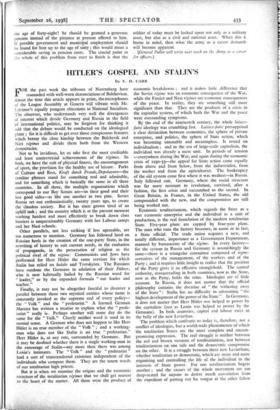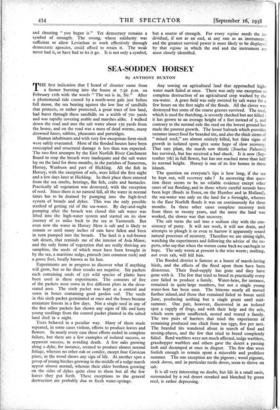HITLER'S GOSPEL AND STALIN'S
By E. H. CARR
FOR the past week the tribunes of Nuremberg have resounded with well-worn denunciations of Bolshevism. About the lime this article appears in print, the microphones of the League Assembly at Geneva will vibrate with Mr. Litvinov's equally pungent objections to National Socialism.
The observer, who understands very well the divergences of interest which .divide Germany and Russia in the field of international politics, may be forgiven for thinking it odd that the debate would be conducted on the ideological plane for it is difficult to get over those conspicuous features which betray the dose kinship between the Bolshevik and Nazi regimes and divide them both from the Western democracies.
Not to be invidious, let us take first the most creditable and least controversial achievements of the regimes. In both, we have the cult of physical fitness, the encouragement of sport, the provision for the healthy use of leisure. Parks of Culture and Rest, Kraft durch Freude,Dopolavoro—the familiar phrases stand for something real and admirable, and for something which is basically the same in all three countries. In all three, the multiple organisations which correspond to our Boy Scouts are—in their good and their less good sides—as like one another as two pins. Soviet Russia set out enthusiastically, twenty years ago, to create the classless society. But it has since grown tired of an uphill task ; and the country which is at the present moment working hardest and most effectively to break down class barriers is unquestionably Germany with her Labour camps and her Nazi schools.
Other parallels, not less striking if less agreeable, are too numerous to mention. Germany has followed hard- on Russian heels in the creation of the one-party State, in the rewriting of history to suit current needs, in the exaltation of propaganda, in the persecution of religion as the political rival of the regime. Communists and Jews have performed for Herr Hitler the same services for which Stalin has relied on kulaks and Trotskyists. The Russians have outdone the Germans in adulation of their Fiihrer, who is now habitually hailed by the Russian word for "leader," or by the expanded formula "our leader and teacher."
Finally, it may not be altogether fanciful to discover a parallel between those two mystical entities whose name is constantly invoked as the _supreme end of every policy— the " Volk " and the "proletariat." A learned German Marxist has written a treatise to explain what the " prole- tariat " really is. Perhaps another will some day do the same for die "Volk." Clearly neither word is used in its normal sense. A German who does not happen to like Herr Hitler is no true member of the " Volk " ; and a working- man who does not like Stalin is no true "proletarian."
Herr Mier is, at any rate, surrounded by Germans. But it may be doubted whether there is a single working-man in the entourage, of Stalin—any more than there was among Lenin's intimates. The " Volk " and the " proletariat " lead a sort of transcendental, existence independent of the individuals who compose them. They are the totem words of our totalitarian high priests.
But it is when, we examine the origins and the economic structure of the totalitarian regimes that we shall get nearest to the heart of the matter. All three were the product of _ , economic breakdowns ; and it makes little difference that the Soviet regime was an economic consequence of the War, while the Fascist and Nazi regimes are economic consequences of the peace. In reality, they are something still more significant than that. They are the products of a crisis in the capitalist system, of which both the War and the peace were outstanding symptoms.
By the end of the nineteenth century, the whole laissez- faire ideology was crumbling fast. Laissez-faire presupposed a clear distinction between economics, the sphere of private enterprise, and politics, the sphere of State action, which was becoming untenable and meaningless. It rested on individualism ; and in the era of large-scale capitalism, the individual was already a mere unit. In periods of tension —everywhere during the War, and again during the economic caisis of 1930-33—the appeal for State action came equally from above and from below, from the industrialist, from the worker and from the agriculturist. The bankruptcy of the old system came first where it was weakest—in Russia. Italy followed suit. Germany, where the social structure was far more resistant to revolution, survived, after a fashion, the first crisis and succumbed to the second. In Great Britain, in France, in the United States, the old compounded with the new, and the compromises are still being worked out.
Economic totalitarianism, which regards the State as a vast economic enterprise and the individual as a unit of production, is the real foundation of the modern totalitarian State. Five-year plans are capped by four-year plans. The man who runs the factory becomes, in name or in fact, a State official. The trade union acquires a new, and totally different, importance as a Government Department, manned by bureaucrats of the regime. In every factory— for the system in Russia and Germany is astonishingly the same—there is a triangular committee composed of repre- sentatives of the management, of the workers and of the Party ; .and it requires little insight to realise that the position of the Party gives it an effective stranglehold. The central authority, masquerading in both countries, now as the State, now as the Party, holds the reins. Ideologies are of little account. In Russia, it does not matter that the official philosophy contains the doctrine of "the withering away of the State " : Stalin has no difficulty in advocating "the highest development of the power of the State." In Germany, it does not matter that Herr Hitler was helped to power by the capitalists (just as Lenin was helped to power by the Germans) In both countries, capital and labour meet in the belly of the new Leviathan.
The problem which confronts us today is, therefore, not a conflict of ideologies, but a world-wide phenomenon of which the totalitarian States are the most complete and uncom- promising expression. The real struggle is neither between the red and brown versions of totalitarianism, nor between totalitarianism on one side and the democratic compromise on the other. It is a struggle between these new Leviathans, whether totalitarian or democratic, which are more and more organising and controlling the life of the individual in the interests of State power. For one totalitarianism begets another ; and the causes of the whole movement are too deep-seated for anyone to derive much consolation from the expedient of putting out his tongue at the other fellow and shouting "you began it." Yet democracy remains a symbol of strength. The strong, whose solidarity-. was sufficient to allow Leviathan to work effectively through democratic agencies, could afford to retain it. The weak never had it, or have had to let it go. It is not only a symbol, but a source of strength. For every rJgime needs the in- dividual, if not as an end, at any rate as an instrument : and the greatest survival power is most likely to be displaye, by that regime in which the end and the instrument ar.f. most closely identified.











































 Previous page
Previous page